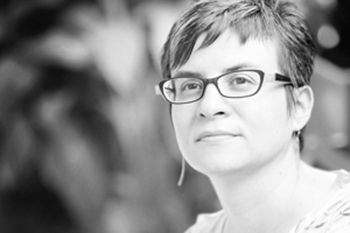The Imaginary Pet
As I was drinking my tea and noting the unique colour of the jacaranda tree, I was struck suddenly by a sad, painful memory: my first pet. She wasn’t cruel or aggressive, quite the opposite, she was a sweet creature, delicate and extremely intelligent (she taught me to read), with a slender body the colour of a jacaranda, so skinny she could have passed for a bookmark. She was my best friend, she went with me everywhere, slept in my bed, came out with me in my bag, played games with me, sang me to sleep. She always kept watch over my dreams, and with her by my side no nightmare ever dared enter my head.
I talked about her all the time and explained her wonderful qualities, above all the way her delicate, long-fingered hands would smack the book if I made a mistake when reading, or the way she would let out a sharp, delicious little scream if I muddled up the words or got one wrong. She was amazing, but they assured me that she was imaginary. Nobody wanted to meet her, they all either laughed at me or looked at me strangely, and some were even rude to me. At first I didn’t care, but after a while their comments irritated me – already I was that crazy girl who talked to herself. And so the inevitable happened: I took it out on my pet. “Why are you imaginary?” I accused her as she watched me with her enormous green eyes. Afterwards I remember she slid towards a book and insisted with a flick of her lizard’s tail that we read together. Needless to say I was furious to see her so indifferent when it was her fault I was suffering so much. So, I picked her up roughly and shut her in a metal cash box, which I pushed right to the back of my wardrobe. I ran out of the bedroom and didn’t return until the evening.
I heard her crying, it could have been three days or ten nights, I don’t know any more: then they turned into screams, and later to ever weaker, more painful whimpers. I covered my ears, repeating, “she is imaginary, she is imaginary,” to myself as I sobbed under the sheets. As time passed the noise stopped and I eventually forgot about it. Until years later, I was about to leave to go to university and was clearing out my room, I found the box at the back of the wardrobe. A light shiver seeped down my back and I opened it hurriedly. When I saw that tiny, off-white skeleton, ancient as a page from an old natural history book, suddenly I understood the certainty I had tried to hide under the sheets: the worst cruelties are always committed because of a blind belief that other people must be right.
(From For Unlikely Travellers)
On Dragons
A short while ago there was a conference on dragons. I, of course, attended. The conference was to prove once and for all the non-existence of those winged creatures, protagonists of so many stories, the cause of sleepless nights, deception and: conferences. The professor, a specialist in dragon lore and other fauna, began his lecture by talking extremely knowledgeably about the animal in question. He referred to it as one of the few monsters continually represented by different communities around the world. He spoke of the stereotypes, principally spread through the iconography of eastern cultures. He described its best known and most terrifying characteristics: vast, with four legs, a neck as long and thin as its tail, webbed wings like a bat, and extremely powerful jaws from which it expels terrible tongues of flame. Then he showed a series of images of winged dragons taken from the Livre des marveilles; others showed a Persian dragon; another, from the Oxford Bestiary, demonstrated that it was strong enough to destroy an elephant, and another very disturbing image showed the dragon as predator, with a half-devoured man hanging from his jaws.
He told us the history of Santa Margarita and her dragon with two heads, of the Chinese dragons, all of which are highly respected and colourful. In truth, he overwhelmed us with so much knowledge, and the effect was to confirm the existence of the monster rather than denying it. Finally, before drawing his talk to a close, he said: “Now, all those who still believe in dragons please leave the room.” Nobody moved, until a chubby, smiling man stood up and left the venue. I followed him. All that information really couldn’t be anything but the truth. Once outside, he offered me a cigarette. “You did well to leave, young lady. Now the spectacle will be even better.”
I didn’t understand what he meant until I saw an enormous winged dragon approach, breathing mighty flames onto the marquee where the conference was taking place. Screaming and more screaming. Blanket terror, shock, and a handful of people passed out on the floor were all that was left by that wonderful apparition: that, and a display of lights and electronic sounds emitting from the animal and flooding the sky. I looked at the chubby man in consternation as I heard him say:
“You did well not to underestimate the power of the imaginary.”
He stubbed out his cigarette and disappeared into the thick smoke that was beginning to clear.
(From Mermaids of Mercury)
***
Cecilia Eudave is a writer and essayist from Mexico. Her short story collections include Técnicamente humanos (1996), Invenciones
Ellen Jones studied English literature and Spanish as an undergraduate and has just completed a Masters in English Language at Oxford. Her interests span the written representation and codification of “non-standard” varieties of English, translation, code-switching and literary multilingualism. She will begin researching a Ph.D. at Queen Mary University of London in October 2014.

